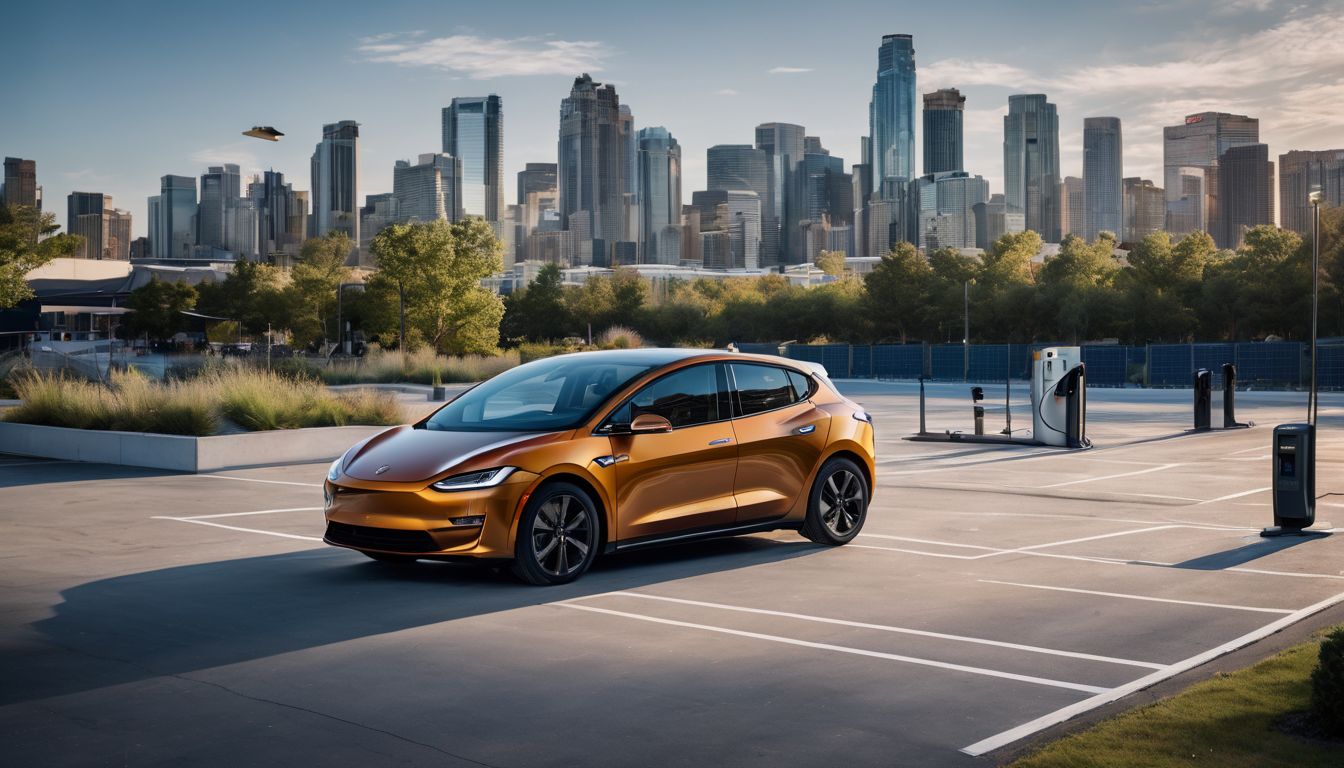As we confront the pressing challenge of shrinking our carbon footprint, it’s heartening to see so many individuals striving for greener choices in how we travel. Rest assured, you’re not alone on this journey; with over a billion vehicles currently tracing their paths across the globe, their collective emissions leave an indelible mark on our environment.
However, there’s a glimmer of hope on the horizon – our newest innovations in environmentally-conscious car designs hold tremendous promise. These developments could very well pave the way towards a future where transportation goes hand-in-hand with caring for our planet.
So let’s buckle up and embrace what lies ahead: a cleaner world begins with every turn of the wheel!
Key Takeaways
- Electric vehicles and battery recycling are leading the shift toward sustainable transportation, reducing emissions and conserving raw materials.
- Innovations such as greener tires, IoT technology, and lightweight materials in cars enhance fuel efficiency and contribute to a cleaner environment.
- Emerging eco-friendly designs include electric pod cars for urban travel, DIY sustainable e-bikes using recycled materials, and solar-powered vehicles that use renewable energy.
- Green car technologies such as battery body panels reduce vehicle weight and reliance on traditional batteries while V2V/V2I systems improve traffic efficiency.
- Eco-friendly cars offer tangible benefits like cost savings from lower fuel consumption alongside reduced environmental impact through sustainability-focused advancements.
Sustainable Car Innovations
Electric Vehicles are becoming increasingly popular due to their reduced emissions and reliance on renewable energy sources. Battery recycling, greener tires, Internet of Things (IoT) integration, and the use of lightweight materials are also driving sustainable car innovations.
Electric Vehicles
We’re witnessing a revolution in sustainable transportation as electric vehicles (EVs) take to the streets. These clean energy cars are leading the charge towards an eco-friendly future, offering low-emission alternatives to traditional petrol and diesel engines.
With each EV on the road, we contribute to reducing our carbon footprint and advancing green vehicle technology.
Transitioning to renewable energy sources for powering our rides, we embrace innovations that promise a greener tomorrow. As more of us opt for electric vehicles, we also fuel advancements in battery recycling and charging infrastructure.
Plugging into this movement means supporting not just cleaner air but also pioneering environmental vehicle design which paves the way for new realms like greener tires and lightweight materials.
Battery Recycling
Car battery recycling is a crucial aspect of sustainable mobility. Recycling old batteries helps in conserving raw materials and reducing the environmental impact of car production.
By repurposing lithium-ion batteries from electric cars, we contribute to the circular economy, ensuring that valuable resources are not wasted. This process reduces the need for mining and extraction of new materials, leading to lower emissions and a healthier environment.
Environmental innovation in battery recycling also supports renewable energy vehicles by providing a second life for used batteries. This eco-friendly approach aligns with the growing shift towards clean energy transportation solutions and promotes sustainable materials in automotive advancements.
Greener Tires
Tire manufacturers are developing innovative ways to reduce the environmental impact of driving. New tyre designs incorporate sustainable materials like natural rubber, silica, and renewable oils.
These eco-friendly tyres not only improve vehicle fuel efficiency but also lessen the overall carbon footprint of vehicles. By creating greener tyres, we can contribute to a cleaner environment and support sustainable transportation solutions.
Furthermore, the development of low rolling resistance tyres significantly reduces fuel consumption by minimising friction between the tyre and the road surface. This innovation promotes energy-efficient car design, making it an essential aspect of green mobility solutions.
Internet of Things (IoT)
The Internet of Things (IoT) technology allows vehicles to be more energy-efficient and eco-friendly. Sensors embedded in cars can monitor tire pressure, engine performance, and fuel usage, helping drivers optimise their vehicle’s efficiency.
Additionally, IoT can assist with traffic management and reduce congestion by providing real-time data on road conditions. With the help of IoT, electric vehicles can be integrated into smart grids, enabling owners to charge their cars during off-peak hours when electricity is cheaper and greener.
Furthermore, IoT promotes car-sharing programmes by connecting individuals with available transportation options nearby. These innovations not only contribute to reducing emissions but also support sustainable transportation development for a cleaner future.
Lightweight Materials
When designing eco-friendly cars, utilising lightweight materials is crucial to improving fuel efficiency and reducing emissions. Innovative materials such as carbon fibre, aluminium, and magnesium alloys are being used to construct car bodies that are strong yet lightweight.
These materials not only contribute to better handling and performance but also reduce the overall energy consumption of the vehicle. By incorporating these lightweight materials into car design, automakers can create more sustainable transportation options that benefit both the environment and drivers.
In addition to enhancing fuel economy, these lightweight materials play a key role in offsetting the environmental impact of manufacturing vehicles. With advancements in material science, engineers can now develop lighter components without compromising safety or durability.
Eco-Friendly Designs for the Future
Explore the exciting future of sustainable transportation, from electric pod cars to DIY sustainable e-bikes and even eco-friendly Lamborghini concepts. These innovative designs are paving the way for a greener, more environmentally friendly automotive industry.
Electric Pod Cars
Electric pod cars offer an efficient and sustainable mode of transportation, with their compact design and electric power source. These vehicles are designed for short-distance travel, reducing the need for conventional petrol or diesel cars in urban areas.
The lightweight materials used in their construction ensure that they have a lower environmental impact compared to traditional vehicles. With advancements in battery technology, these eco-friendly pod cars are becoming more practical and affordable, offering environmentally conscious individuals a viable alternative for their daily commute.
Incorporating energy-efficient features such as regenerative braking and smart charging systems, electric pod cars contribute to reduced emissions and lower environmental impact while providing cost savings and promoting sustainable transportation solutions.
DIY Sustainable E-Bikes
Transitioning from the concept of electric pod cars, we now explore a practical and sustainable transportation solution – DIY Sustainable E-Bikes. These environmentally-friendly bicycles offer an efficient means of travel while reducing our carbon footprint. They are typically created using recycled materials and energy-efficient components to ensure minimal environmental impact. Let’s delve into some innovative features that set these eco-conscious e-bikes apart:
- Recycled Frame: Many DIY sustainable e-bikes are constructed using repurposed or recycled materials, such as aluminium frames from old bicycles, reducing the demand for new resources.
- Solar Charging Capabilities: Some models incorporate solar panels to harness renewable energy, allowing riders to charge their e-bikes using clean and sustainable power sources.
- Upcycled Components: Innovative designs often utilise upcycled parts from various sources, promoting resourcefulness and sustainability in the manufacturing process.
- Energy-Efficient Motors: The use of low-energy consumption motors ensures that these e-bikes operate with minimal impact on the environment.
- Eco-Friendly Battery Solutions: Implementing rechargeable lithium-ion batteries significantly reduces the ecological footprint of these e-bikes, contributing to a cleaner and greener transportation ecosystem.
Sustainable Lamborghini Concepts
Lamborghini is exploring sustainable concepts by integrating eco-friendly materials and advanced technologies into their designs. The company’s commitment to environmental innovation includes developing electric and hybrid options, implementing lightweight yet durable materials, and incorporating aerodynamic designs to reduce energy consumption.
These sustainable Lamborghini concepts align with the growing demand for clean energy vehicles and demonstrate the brand’s dedication to providing environmentally friendly automotive advancements that appeal to eco-conscious individuals.
The incorporation of solar technology into Lamborghini vehicles represents another exciting frontier in sustainability. By harnessing solar power, these cars could recharge while parked or even generate enough energy to supplement traditional charging methods.
Solar Vehicles
Solar vehicles utilise solar panels to harness energy from the sun, converting it into electricity to power the vehicle’s engine. These vehicles are a promising innovation in eco-friendly transportation, offering a sustainable and renewable energy source that significantly reduces carbon emissions.
With advancements in solar technology, these vehicles can be designed with integrated solar panels on the roof or body of the car, capturing sunlight and converting it into usable energy throughout the day.
This clean energy solution aligns perfectly with environmentally conscious individuals’ support for conservation efforts and sustainable transportation design.
Innovations in solar vehicles contribute to reducing our reliance on fossil fuels while offering a more sustainable mode of transportation. The emergence of electric pod cars and DIY sustainable e-bikes also showcases how accessible eco-friendly transport options are becoming.
Self-Sufficient Prefab Houses
Transitioning from sustainable transportation to eco-friendly living spaces, self-sufficient prefab houses are gaining popularity among environmentally conscious individuals. These innovative dwellings incorporate energy-efficient features such as solar panels and rainwater collection systems, reducing reliance on traditional energy sources.
Additionally, the use of sustainable materials in construction contributes to lower environmental impact and promotes a greener lifestyle.
Furthermore, self-sufficient prefab houses embrace eco-conscious design by implementing smart technologies for efficient energy management and waste reduction. This approach aligns with the values of conservation and sustainability while offering a more environmentally friendly housing solution for the future.
Biodegradable Barbecues
Biodegradable barbecues are revolutionising outdoor cooking by reducing the environmental impact of traditional disposable grills. These eco-friendly alternatives are made from sustainable materials such as bamboo or cardboard, which can be easily composted after use.
By choosing biodegradable barbecues, we can minimise the waste generated from single-use grills and contribute to a cleaner environment. The simplicity and convenience of these earth-friendly options make them an ideal choice for environmentally conscious individuals looking to enjoy outdoor activities without compromising their commitment to conservation.
Introducing biodegradable barbecues aligns with our goal of promoting ecoconscious choices in all aspects of life, including recreational activities. We believe that making small changes like opting for sustainable grill options significantly contributes to reducing our environmental footprint while still enjoying leisure time outdoors.
Advancements in Green Car Technologies
Advancements in green car technologies have led to the development of battery body panels, charging infrastructure, sustainable raw materials, innovative battery designs, and vehicle-to-vehicle (V2V) and vehicle-to-infrastructure (V2I) technologies.
These innovations are paving the way for a more sustainable and eco-friendly future in transportation.
Battery Body Panels
Battery body panels are an exciting innovation in eco-friendly car design. These lightweight and durable panels not only reduce the overall weight of the vehicle but also double up as a source of power storage.
With integrated battery cells, these panels can store energy that can be used to power various vehicle systems, reducing the reliance on traditional heavy batteries.
Incorporating battery body panels into cars enhances energy efficiency, reduces emissions, and contributes to sustainable transportation solutions. This technology aligns with environmentally conscious automotive design by promoting clean energy vehicle technologies and eco-friendly automotive advancements in line with low-impact automotive engineering trends.
Charging Infrastructure
With the shift towards eco-friendly cars gaining momentum, the development of a robust charging infrastructure is crucial for supporting widespread adoption. Establishing accessible and efficient electric vehicle charging stations is essential to alleviate range anxiety and promote confidence in electric car ownership.
Implementing smart technologies, such as IoT-enabled chargers, can enhance user experience by providing real-time information on available charging stations and enabling seamless integration with renewable energy sources.
Moreover, integrating green transportation solutions into urban planning can further facilitate the expansion of charging infrastructure. By incorporating EV-specific parking spaces and incentives for businesses to install chargers, cities can actively contribute to the growth of sustainable mobility options.
Sustainable Raw Materials
Car manufacturers are shifting towards sustainable raw materials to reduce the environmental impact of their products. Using eco-friendly materials like recycled plastics, natural fibres, and bio-based composites can help lower the carbon footprint of vehicle production.
These materials not only decrease reliance on non-renewable resources but also promote a circular economy by reducing waste and energy consumption in the manufacturing process. Incorporating sustainable raw materials in car design aligns with our commitment to environmentally conscious automotive advancements and ensures a greener future for transportation.
To enhance the sustainability of automotive innovations, it is crucial to embrace green practices throughout the entire supply chain. By prioritising sustainable raw material sourcing, car manufacturers can contribute positively towards climate-friendly car engineering and low-impact automotive advancements while meeting the demands of eco-conscious consumers who support conservation and environmental awareness.
Battery Design
Transitioning from sustainable raw materials, another critical factor in eco-friendly car design is the innovative battery design. Green car technologies rely heavily on the development of efficient and sustainable energy storage solutions.
These batteries are essential for powering electric vehicles and reducing environmental impact while offering a cleaner and more sustainable mode of transportation.
Innovations in battery design focus on improving energy density, extending lifespan, and using environmentally friendly materials to create low-impact automotive advancements. By harnessing cutting-edge research and technology, we can continue to drive progress towards a greener future with energy-efficient car designs that minimise emissions and promote sustainability.
V2V and V2I Technologies
V2V and V2I (Vehicle-to-Vehicle and Vehicle-to-Infrastructure) technologies enable cars to communicate with each other and with the surrounding infrastructure, fostering a more efficient and safer transportation system.
With V2V, vehicles share real-time data such as speed and position, allowing them to anticipate potential collisions and prevent accidents. On the other hand, V2I technology allows vehicles to connect with traffic lights, road signs, and other infrastructure elements.
By leveraging this connectivity, drivers can receive valuable information about traffic conditions, helping reduce congestion and minimise fuel consumption.
Benefits of Eco-Friendly Cars
Eco-friendly cars offer reduced emissions, lower environmental impact, cost savings, sustainability, and advancements in transportation. These benefits make them a wise choice for environmentally conscious individuals looking to support conservation and environmental protection.
Reduced Emissions
Ecofriendly vehicles reduce harmful emissions, improving air quality and mitigating climate change. Lowering carbon footprint is crucial for a sustainable future, benefitting the environment and our health.
Green car designs incorporate advanced technologies to curb emissions through efficient fuel consumption, innovative battery usage, and cleaner energy sources like solar power or electricity.
These ecoconscious automotive advancements promote responsible driving and contribute to a healthier planet while demonstrating our commitment to conservation.
Lower Environmental Impact
Transitioning from reduced emissions to lower environmental impact, it’s clear that eco-friendly cars offer significant benefits. The use of sustainable materials and energy-efficient technologies further minimises the vehicles’ carbon footprint.
By promoting low-impact automotive advancements, we can enhance our efforts towards a greener future while contributing positively to the preservation of our planet. These innovations in eco-conscious car features not only reduce harmful emissions but also actively work towards conserving resources and reducing environmental degradation associated with traditional transportation methods.
The development and adoption of climate-friendly car engineering play a crucial role in reshaping the landscape of green transportation innovations, providing us with energy-efficient car designs that prioritise sustainability without compromising performance or style.
Cost Savings
Transitioning from lower environmental impact to cost savings, eco-friendly car designs offer significant financial benefits. By opting for electric vehicles and sustainable transportation solutions, individuals can save on fuel costs.
The use of lightweight materials in car construction reduces the overall weight of the vehicle, leading to increased fuel efficiency and reduced expenses at the pump.
Additionally, advancements in battery technology and charging infrastructure contribute to lower maintenance costs over time. With long-lasting batteries and efficient charging systems, eco-friendly vehicles present a more economical option for environmentally conscious consumers.
Sustainability
Eco-friendly car designs prioritise sustainability, seeking to reduce environmental impact and promote long-term conservation. Embracing environmentally friendly automotive innovations, such as electric vehicles and greener tyres, contributes to lower emissions, energy-efficient car design, and overall reduced environmental impact.
These low-impact automotive advancements not only benefit the planet but also bring cost savings for individuals while supporting climate-friendly car engineering efforts.
Advancements in eco-conscious automotive design are essential for the future of transportation. By incorporating sustainable materials and energy-efficient technologies, we can continue to drive innovation while minimising our carbon footprint.
Advancements in Transportation.
Advancements in transportation have led to the development of electric vehicles, offering a sustainable alternative to traditional cars. These energy-efficient automobiles are designed to reduce emissions and lower environmental impact, contributing to a more eco-friendly future.
The growing infrastructure for charging stations supports the widespread use of electric vehicles, making it easier for individuals to make the switch towards low-emission automobiles.
Moreover, advancements in V2V and V2I technologies allow these vehicles to communicate with each other and with infrastructure, enhancing safety and efficiency on the roads. These developments reflect a shift towards climate-friendly car engineering that aligns with our Earth-friendly vehicle technology goals.
In addition, greener tires made from sustainable raw materials contribute significantly to low-impact automotive advancements by reducing fuel consumption and improving overall energy-efficiency.
Conclusion
In conclusion, sustainable car innovations like electric vehicles and greener tires are transforming the automotive industry. Eco-friendly designs for the future, such as electric pod cars and DIY sustainable e-bikes, offer promising solutions for environmentally conscious individuals.
Advancements in green car technologies, like battery body panels and V2V/V2I technologies, continue to drive low-impact automotive advancements forward. The benefits of eco-friendly cars include reduced emissions, lower environmental impact, cost savings, sustainability and advancements in transportation.
These earth-friendly vehicle technologies demonstrate a commitment to eco-conscious automotive design.
FAQs
1. What are innovations in eco-friendly car design?
Innovations in eco-friendly car design include low-emission automobiles, energy-efficient engineering, and the use of ecoconscious features that have less impact on our planet.
2. How do these eco-conscious automotive designs help the environment?
Eco-aware automotive trends focus on creating vehicles with climate-friendly engineering that reduce pollution and conserve resources, helping to protect our Earth.
3. Can I expect good performance from an earth-friendly vehicle?
Yes, modern earthfriendly vehicle technology not only prioritises the environment but also ensures drivers enjoy high-quality performance and innovative car features.
4. Are there many options for low-impact automotive advancements?
The auto industry is continually growing with new lowimpact automotive advancements, offering a diverse range of ecofriendly technological solutions for environmentally conscious drivers.





